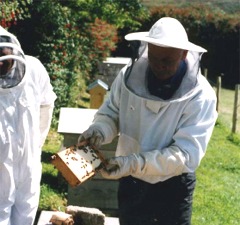|
|
Local beekeepers feel the sting
03.06.08
No honey for sale
this year
by Simon McGeady, Inishowen
Independent
BEEKEEPERS in Inishowen face a bleak summer with
honey production expected to reach its lowest levels
in decades.
At the May meeting of the Foyle Beekeepers'
Association, held last Monday, the problem of
dwindling numbers of bees topped the agenda.
Association chairman, Willie McMullan, has seen his
colony reduced from over thirty hives to just a
handful of healthy hives this summer.
This year, for the first time in years, he will have
no honey to sell. |
 |
“I’ve been keeping bees
for 35 years and I’ve never had a year so bad. The
organic stores and farmers markets have been calling
me up to supply them with honey, but I’ve had to
tell them there will be none this year. I’ve no
honey to give them, I’ll be lucky if I get a few
jars for myself and my friends.”
He blames a combination of factors for the decline
of honeybees, including the increasingly mild Irish
winters |
and mobile phone
transmissions.
“Last summer was very wet and that weakened the
hives. Then, because of the mild winter, the bees
left the hive too early and died when the weather
turned cold. When the temperature falls below 40
degrees [Fahrenheit] the bees wings are paralysed.”
For Mr McMullan, there is more to the problems at
his Kinnego colony than weather fluctuations. He
believes that our love of mobile phones has
contributed to the abrupt disappearance of his bees
over the last couple of years.
“It’s my interpretation that mobile phone signals
are disrupting the honey bees flights. There are
other beekeepers that think the same as me.”
The unproven theory is that radiation from mobile
phones interfere with bees navigation systems,
preventing them from making their way back to their
hives.
“I am the sort of beekeeper who wouldn’t manipulate
the hives but I only have two or three good hives
left. I’ll divide them and hopefully double the
number of healthy hives for next year,” added Mr
McMullan.
Meanwhile, Moville-based priest Fr Paddy O’Kane has
reported the arrival of the Varroa mite at his
apiary in Culdaff this spring. Last year the mite
was discovered in bee hives in Greencastle.
The parasite, which attaches itself to the body of
the honey bee and spreads virus’ throughout the
hive, can lead to the destruction of the entire
colony.
The long-time beekeeper, who has four hives, intends
to wait until the end of the honey producing process
before deciding what to do about the problem so as
not to interrupt the bees natural cycle. |
|

